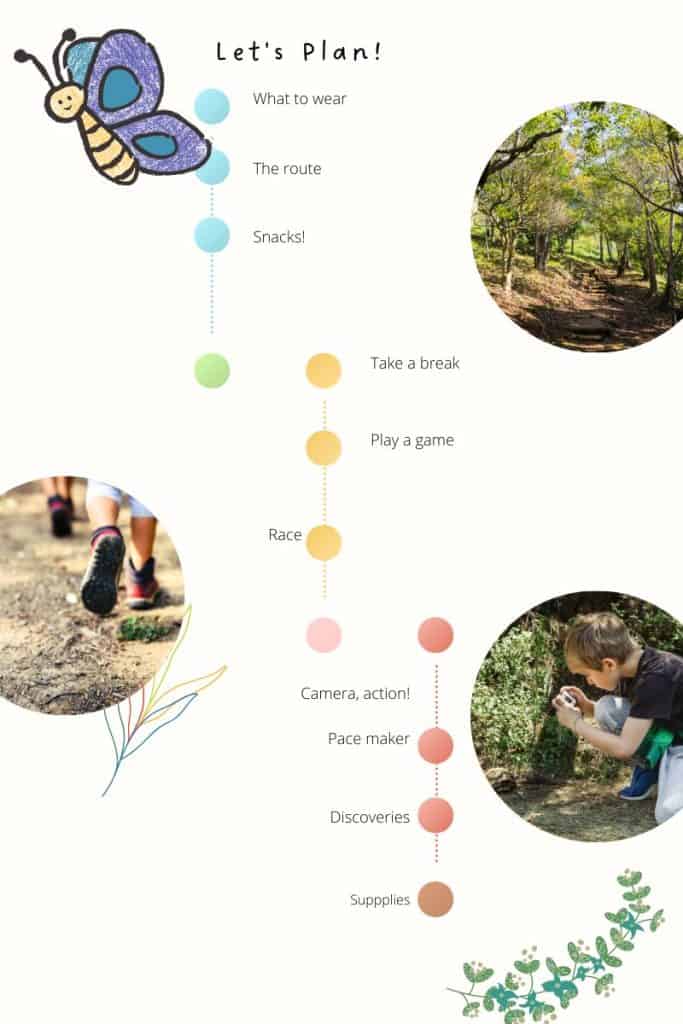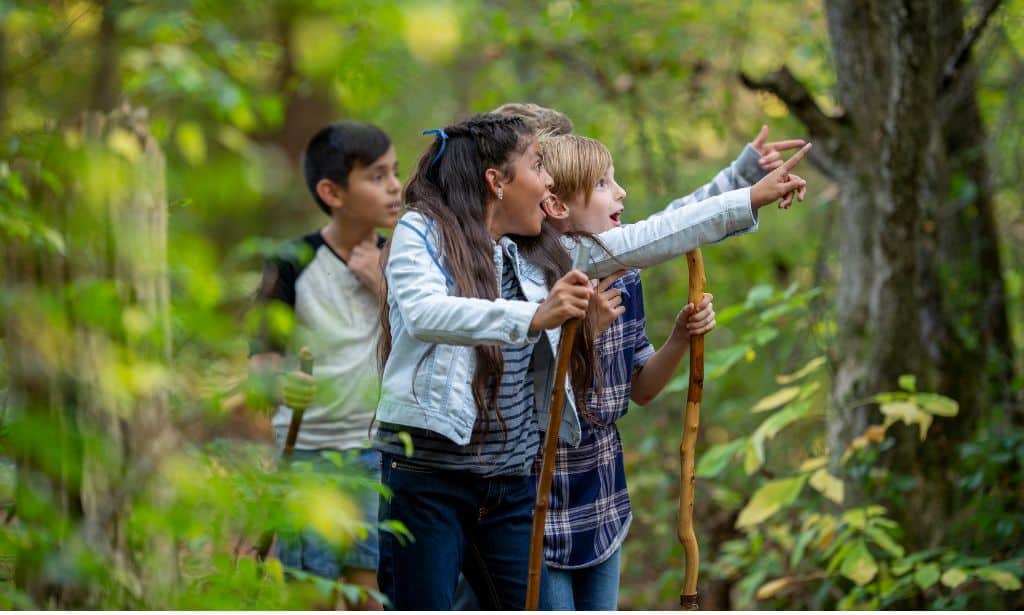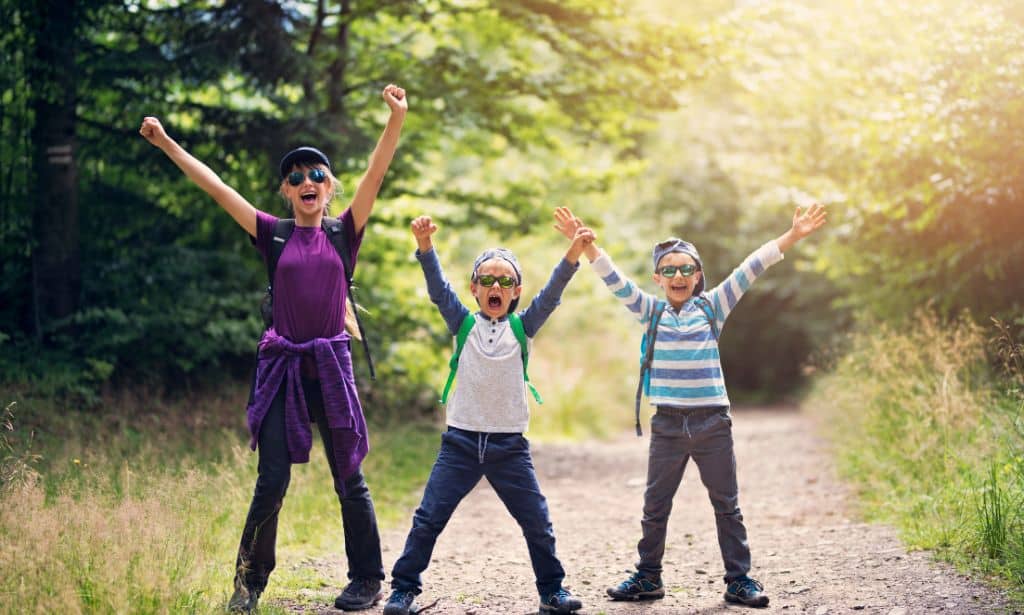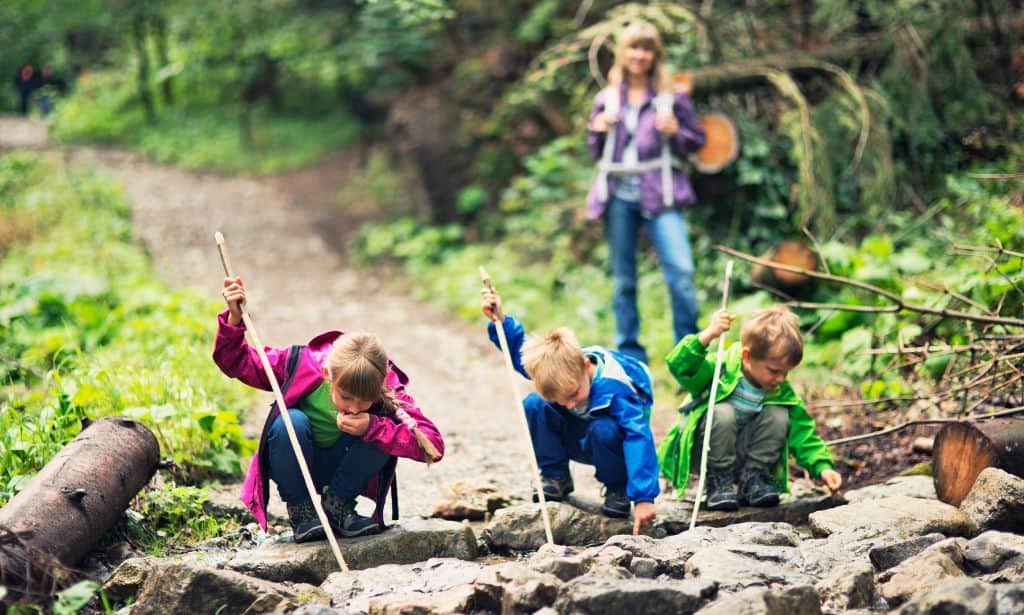Entertaining your kids on a hike isn’t always an easy thing. Back home, they have toys, gadgets, and friends and still get bored. Imagine being on a hike with bored kids without gadgets, toys, or friends! Disastrous.
At least, that’s how it was for me before I learned how to motivate my kids when we hike. Yes, I’m one of those moms who sometimes give the kids my phone so I can focus.
But entertaining my kids during a hike is different. I have to be involved, and I have to keep them interested. So today, I’ll share some things that worked for my family.

- 1. Plan the Hike Together
- 2. Give Your Kids Responsibilities
- 3. Schedule Rests
- 4. Include Your Kid’s Friends
- 5. Carry Child-Friendly Gadgets
- 6. Play Games
- 7. Choose Trails With Interesting Features
- 8. Have One-On-One Talks
- 9. Celebrate Goals
- 10. Encourage Your Kids
- 11. Let the Kids Lead
- 12. Take Time to Be Quiet
- 13. Be Part of Kids’ Discoveries
- 14. Positively Communicate With Kids
- 15. Focus On Their Comfort
- 16. Keep the Hike Short
- 17. Bring the Dog if Possible
- 18. More Treats, Snacks, and Rewards
- 19. Go With Their Pace
1. Plan the Hike Together
It’s tempting to do all the planning yourself, but when you involve your kids, they take ownership of the hike. So first, we look at hiking options, and I ask them which trail they would like to take. Once that’s settled, we will discuss the day and time.
Of course, I try to steer them toward what will work for everyone in the family but sometimes, I also reschedule some items to accommodate their needs. The fun part is always deciding which snacks we will cray, the games to play and how long we will hike.
We try to remain flexible but stick to the plan as often as possible. This shows the girls that family time planning and sticking to it is as important as other activities.
2. Give Your Kids Responsibilities
Children must learn to take charge of situations and work in a diverse team. For example, my girls may be blood, but their preferences are always as different as the summer and winter. However, when planning for hikes, each girl gets to choose what everyone else will do.
For instance, my eldest could come up with games we will play during the hike while her sister decides the snacks we will carry. These responsibilities force them to consider everyone’s needs and include them in the hike instead of thinking of their own needs alone.
It also makes them take ownership of the hike and learn how to plan and organize activities. I try not to intervene unless they are struggling with something and can’t figure out what to do.
3. Schedule Rests
Usually, I’m not too fond of stressful situations, and looking at a 3 hours hike as a whole always seems more difficult than after it’s divided into shorter periods with rests in between. Think of it as you would a work project. It’s always more stressful before you divide it into smaller goals.
That’s the same thing we do. For example, if we plan on hiking for 2 hours, we decide how many resting points we want and how long it will take us to get to the resting point. We also schedule hiking games and activities we can do to keep things interesting.
For instance, we may hike for 30 mins and rest for water and stretches. Then, hike for another 30 mins and rest for water, snacks, and a game.

4. Include Your Kid’s Friends
One problem I faced with my 11-year-old was that she didn’t want to keep hanging out with us. I get it, she wants to spend more time with her friends, and she has a few things in common with her six-year-old sister.
To make hikes more motivating, I encouraged her to invite some friends or ask one of her teen cousins if they wanted to join us. Hikes suddenly became more entertaining, and she could walk for longer. Of course, her sister also wanted to invite a friend, which was fine.
Inviting friends helps your child build stronger relationships by giving them a chance to connect outside school. But, as expected, they will still talk about school stuff like sports teams and homework, video games, and who has a crush on who.
Hikes with friends also turn into play which is a great way to keep your kids entertained. And when they get tired, seeing their friends going will motivate them to keep going.
5. Carry Child-Friendly Gadgets
Ever seen a child who doesn’t like taking photos? A camera is one of the best ways to keep your kids entertained on a hike. They get to explore what’s happening and capture every moment while at it.
Child-friendly binoculars and magnifying glasses are also great at helping kids spot things out of reach or make bugs look bigger. Instead of using your phone to navigate, use an actual map and let your kids take the lead and find directions.
If you don’t have hiking poles, task everyone with finding a long stick they can use as a pole. It will be a fun way to ensure you are all participating.
Remember those rests you scheduled? Well, you need a timekeeper to tell you when it’s time to rest. You can assign one of your kids to this role, even the younger ones, so they have the thrill of announcing it’s time to rest. The anticipation and delayed gratification build their resilience.

6. Play Games
There are tons of games you play with your kids during hikes. Think of spy, hide and seek, scavenger hunts, and even nature bingo. Games keep everyone involved and motivated to keep moving even when things get uncomfortable.
They are also great for the whole family to bond and have a little healthy competition. Some of our favorite games are:
- Finish the story – We love this game because it never ends and gives everyone a chance to use their imagination. One person starts the game with an idea (in one sentence), then everyone adds to the story by saying what happened next using one sentence.
- Name that tune – we love music, and one of the ways we keep busy on the trail is by naming tunes. One person hums a tune, and it’s everyone else’s responsibility to guess which song they are humming.
- Collect souvenirs – souvenirs are a great way to keep everyone observing their environment to spot those gems they would like to take back home. My eldest always brings back a collection of smooth stones, while her sister takes whatever can fit into her backpack. We often have to leave some behind.
- Hide and seek – this classic helps keep the pace, especially when guys are getting a little tired and moving slowly. One person will run ahead and hide in the bush or behind the tree, and everyone else will try and find them. Every once in a while, we let the kids try to scare us, making the game more interesting.
- Nature journaling – I love to write, and my eldest seems to have joined this little hobby of mine. My youngest, however, prefers to play with paint with her dad. Either way, we always set aside time to write or draw what we thought was interesting in the hike or what we learned.
7. Choose Trails With Interesting Features
Hiking trails often have interesting features. Some have streams where your family can play with water, while others have gardens, picture-perfect mountains, and other ecosystems where you can learn something new.
Picking a trail with a feature for the kids to look forward to is a great way to engage and keep them motivated. This is also where their camera skills are tested as they try to capture every moment.
8. Have One-On-One Talks
This is usually the best part of hiking with my kids for me. I get a chance to steal each girl for a short time so we can chat and catch up on what is happening in their lives. My eldest, Olly, will often talk about school work and her relationships with her friends, while her sister, Jaz, talks about everything and anything.
We don’t plan when these one-on-one talks will take place and instead go with the flow. If I have something to talk to the girls or my spouse about, I look for a great opportunity to introduce the topic.

9. Celebrate Goals
Celebrating when you achieve your goals is a great way to build confidence and feel good about your achievements. It’s also a great way to show the kids that they earned something, even when things are challenging. Thus, building perseverance and resilience.
Gifts could be anything from candy, more time on their gadgets, ice cream, or the chance to pick the next holiday destination. I usually base it on what’s happening in the family when we go for a hike and give a gift based on that.
For instance, if one is grounded, having more responsibilities during the hike, being kind, and demonstrating they are sorry for their behavior can result in not being grounded anymore.
10. Encourage Your Kids
Everyone needs a cheerleader in their life, and nobody does it better for kids than mom and dad. But, unfortunately, while you and your spouse can control yourself and keep going, kids will often stop as soon as their little feet and bodies tell them it’s time to rest.
Cheering them on will help keep the whole team moving and show the kids you are there for them even when things are challenging. Praise them when they achieve a hiking goal, keep pace, and even help each other. A pat on the back goes a long way.
11. Let the Kids Lead
Your job as a parent is to lead your kids, but according to a study by Stanford University, too much parental direction can be counterproductive. For example, children of parents who stepped in to give instructions, correct something, or make suggestions despite their kids being appropriate on tasks had a harder time regulating their behavior.
During the hike, let your children take the lead to grow their leadership skills. Naturally, kids feel important when adults look up to them, which builds their self-esteem and confidence. First, however, consider the route you are hiking and at what point the kids should lead.
For instance, younger kids should lead where the train is easier, while teens can take on more challenging parts of the hike. Also, if cliffs are on the trail, be sure to lead and help the younger kids navigate these parts.
12. Take Time to Be Quiet
Silence is golden, and while you want to keep kids engaged all the time and have them moving, it’s also as important to give each person time to reflect and be with their thoughts. This time is great for reflecting on your time together, challenges they are facing, or whatever else is on their mind.

13. Be Part of Kids’ Discoveries
Along the trail, kids will identify a few monumental and mundane elements they like. Be kind enough to stop and admire anything they point out. Then, discuss their discoveries and build a conversation that will keep them interested.
Recognizing the contributions of your kids to the group makes them feel at par and in sync with the whole experience. Any positive comment they make about what they see as they move should be a big deal because you cannot ignore their discovery. Ignoring their unique discoveries will force them to mentally lockout motivation for the hike.
14. Positively Communicate With Kids
The foolproof way to dim your kid’s enthusiasm is by making negative comments. Try to avoid being negative during the hike because it is your energy that drives the kids. By exuding positivity, you can directly contribute to their motivation all through.
For example, if they ask about the remaining distance, communicate what awaits at the next goal without saying that you still have more distance to cover.
15. Focus On Their Comfort
Kids will certainly feel uncomfortable and unmotivated to hike if they are cold or their clothes are wet. Therefore, hiking with children under bad weather is not advisable, and even if the mountain weather is unpredictable, be prepared for the occasion.
Be updated on the hourly weather forecast of your hiking location. Carry extra clothing for bad weather and maybe extra pairs of shoes. If you will spend your day with them under the scorching sun, apply some sunscreen on them and give them hats. Doing this protects them from the sunburns that make the trip uncomfortable.
16. Keep the Hike Short
As a parent, you might feel like turning back before reaching your destination is failing. For kids, turning back means that they have done enough for the day. If you have tried these tips and your kids are still disinterested, maybe it is time to head back home.
Forcing kids to keep walking for more hours affects their experience, and they will never agree to any hikes in the future. If you realize that motivating them is not pushing them ahead, call it a day and keep the hike short and memorable.
Please do not show disappointment and speak positively to them to make their day worthwhile.

17. Bring the Dog if Possible
This might not apply to most hiking families, but it is worth the try. Depending on the size of your dog, hiking along with the family pet can motivate your children to finish the trail.
If they have a close relationship with the dog and can command it, they would enjoy playing catch along the way to kill time. Dogs are usually enthusiastic hikers; their energy can reflect on your children.
18. More Treats, Snacks, and Rewards
Kids will not stop eating during a hike because they need that energy boost. So as you pack, remember to have a special carriage for snacks and treats. Having more water also helps with the journey.
Considering that you will be handing them snacks as rewards for completing tasks, they will always be looking forward to completing the hike and completing tasks. Sometimes I walk with my kids and stop for snacks from time as we plan a picnic once we reach the end of the trail.
19. Go With Their Pace
Another strategy that works when hiking with kids is that you always walk at their pace. Kids are explorative, curious, and like examining every aspect of their journey. While you can give them room to explore deeper and interact, keep reminding them that you still have a goal to achieve at your next stop.
Backpacking with kids is fun and rewarding; every second of it is worth it. All you need to do is keep your hikes shorter first as you give your kids time to adjust to the new adventures.
While planning, sit with them and let them be part of the process so you can include everything that matters to them. It will, however, not be easy because there are some challenges you will face along the way. Enjoy your surroundings and make the trip memorable even as you return home.




